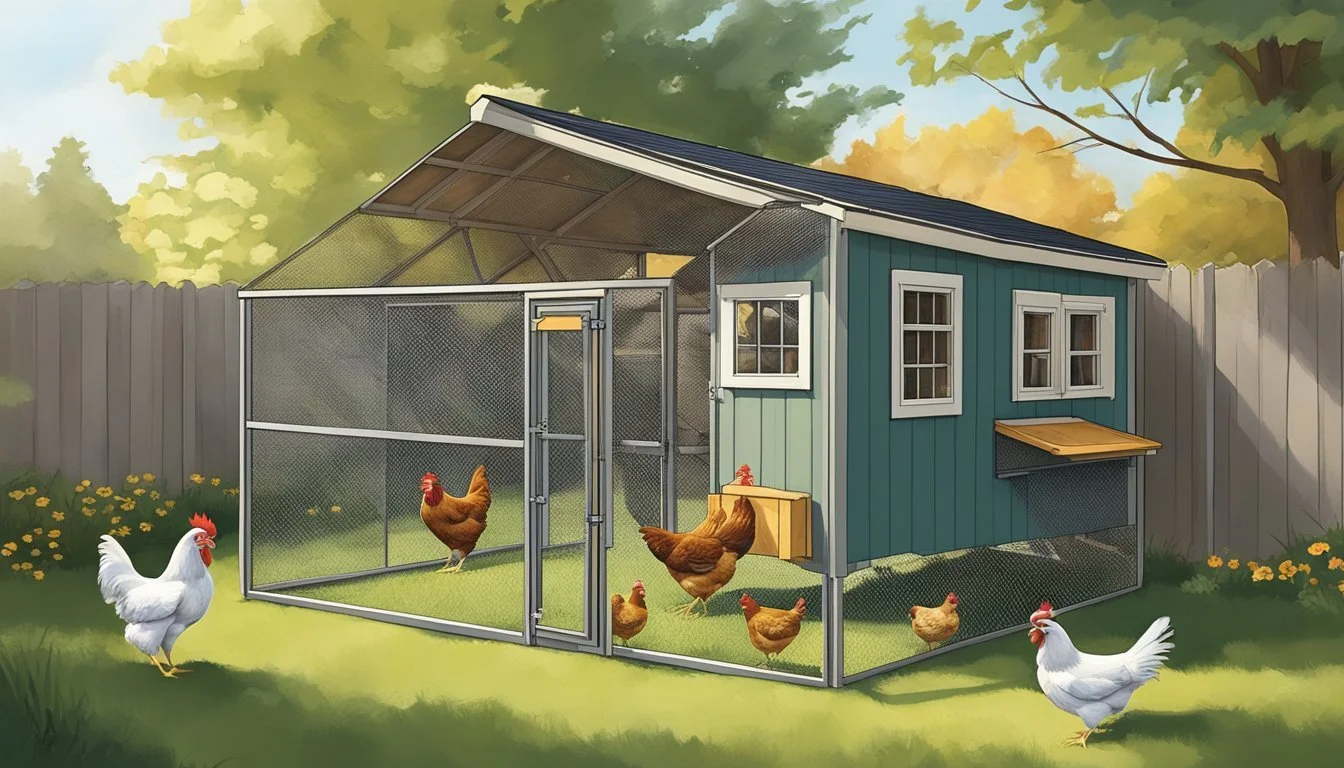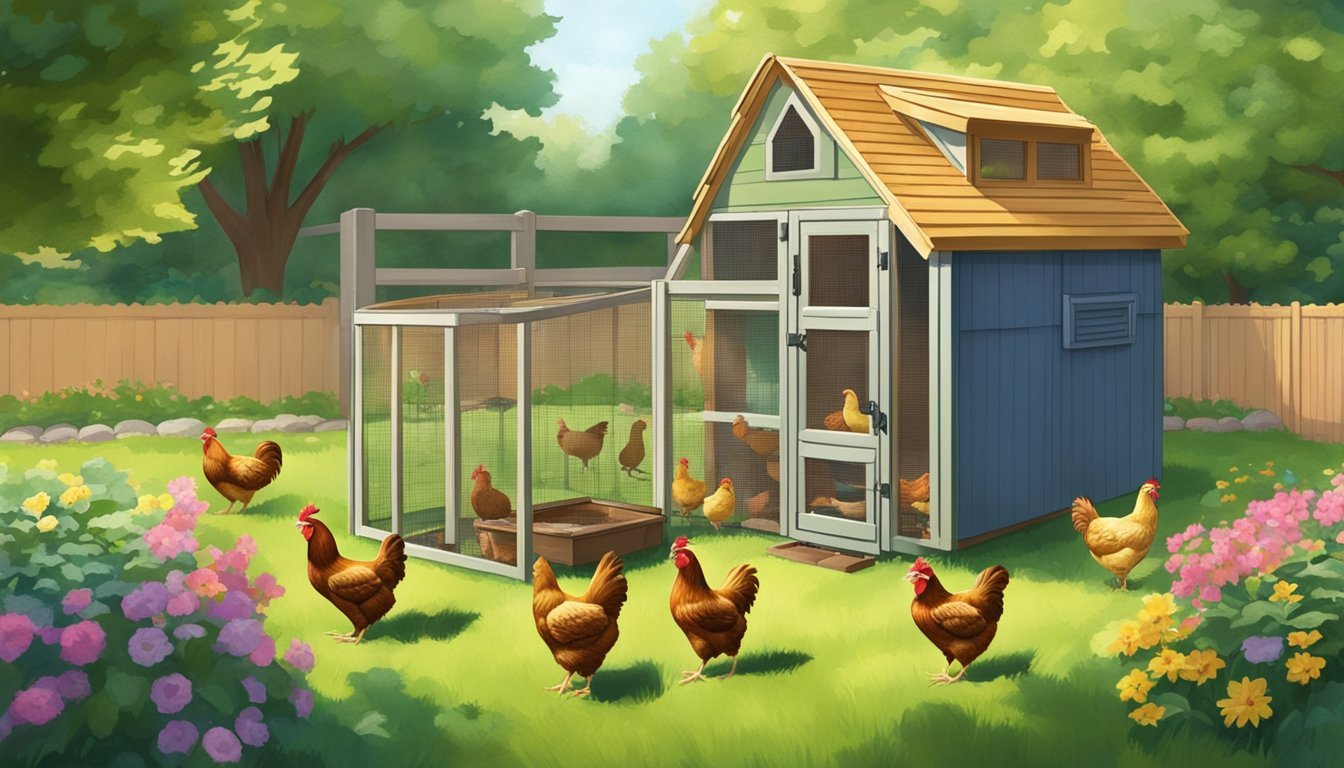Raising Backyard Chickens in Eagan, MN
Your Essential Guide to Urban Poultry
Raising backyard chickens has become an appealing option for residents of Eagan, Minnesota seeking a more sustainable lifestyle and the pleasures of fresh eggs. The Eagan City Council has recognized this interest and, as a result, has passed an ordinance amendment that allows the keeping of chickens in residential areas. This progressive step reflects a growing movement across urban areas, where people are interested in local food production and the joys of connecting with agrarian roots.
Before Eagan residents embark on their journey of poultry husbandry, it’s important to understand the specific requirements set forth by the city to ensure both human and animal residents coexist harmoniously. The city mandates that a free permit is obtained by those wishing to keep chickens, ensuring that all participants are in compliance with local regulations. This includes limiting the number of chickens to five per property, a prohibition on roosters, and the implementation of proper housing that requires a minimum of two square feet per chicken in the coop.
In addition to legal prerequisites, prospective chicken keepers are also advised to consider the practical aspects of raising chickens. Proper care includes providing adequate space for the birds to roam, ensuring their safety from predators, and maintaining cleanliness to prevent any potential nuisances or health concerns. With these guidelines in mind, Eagan residents can join the ranks of urban chicken enthusiasts, contributing to a green initiative and garnering the benefits of fresh eggs right from their backyard.
Understanding Local Regulations
Residents of Eagan, MN who are considering raising backyard chickens must navigate a set of local regulations designed to balance urban agriculture with community standards. Being well-informed on these rules is crucial for a successful and legal backyard flock.
Permitting Process
In Eagan, obtaining a permit is a prerequisite for raising backyard chickens. Residents should contact city officials to acquire the latest documentation and guidelines. An application fee may be required, and permits often have to be renewed annually.
Key Ordinances Affecting Chicken Raising
The Eagan City Council has established ordinances that dictate the keeping of chickens. These laws pertain to the number of chickens allowed, the maintenance of coops, and the distance these structures must be kept from neighboring homes.
Residential Area Requirements
Chickens are only allowed within residential areas that comply with the local chicken laws. Coops must be situated in the backyard and constructed to prevent any escape of chickens or entry of predators.
Roosters and Noise Considerations
Roosters are typically regulated due to noise concerns. Crowing can lead to disturbances within the community. Eagan’s regulations may restrict the keeping of roosters or impose conditions to address noise concerns.
Health and Odor Control Regulations
To minimize the risks of disease and odor, Eagan may have specific requirements regarding the cleaning of the coop and overall hygiene practices. Regular maintenance is essential to ensure sanitary conditions and minimize potential impacts on neighbors.
Other Relevant Eagan Policies
Additional policies may include notification or consent of neighbors, restrictions on the sale of eggs or meat, and adherence to state guidelines for the handling of poultry to mitigate health risks. Staying informed through local news, Patch newsletters, or city alerts can help residents keep up with any changes to these policies.
Setting Up Your Chicken Coop
In Eagan, Minnesota, residents are permitted to raise backyard chickens, but it is essential to set up a well-designed and secure coop to ensure the health and safety of the flock. Proper location, design, and maintenance are critical to preventing issues with predators and diseases.
Choosing the Right Location
A chicken coop's location should provide ample sunlight, good drainage, and protection from harsh winds. Ensuring at least 2-3 square feet inside the coop and 8-10 square feet outside per chicken is essential for their well-being. When selecting a site in a backyard, it's important that it complies with Eagan's local zoning regulations.
Coop Design and Safety
The coop must be sturdy and well-ventilated. Windows should be covered with heavy-duty wire to keep predators out while allowing light in. The coop design must include roosting poles and a nesting area. Secure latches and reinforced locks are crucial for keeping chickens safe, especially at night.
Protecting Against Predators
Use hardware cloth instead of chicken wire for added security against predators such as raccoons and foxes. Burrowing animals can be deterred by burying the cloth deep around the perimeter. Automatic door openers can ensure the coop is sealed at dusk.
Maintaining Cleanliness and Hygiene
Regular cleaning is vital to prevent diseases and parasites. The coop should have easy-to-clean surfaces and proper waste management systems. Fresh bedding—like straw or wood shavings—should be replaced often to maintain hygiene and reduce odors. Implementing a routine for daily and weekly cleaning tasks will help prevent illness and promote a healthy flock.
Choosing Your Backyard Chickens
When selecting chickens for a backyard flock in Eagan, Minnesota, it's important to consider breed characteristics, where to obtain the birds, and how many chickens are suitable for the space and regulations.
Understanding Chicken Breeds
Various chicken breeds offer different advantages and can impact the experience of raising backyard chickens in Eagan, MN. Rhode Island Reds are admired for their hardiness and consistent egg laying. Wyandottes are another popular choice, known for their beautiful plumage and good temperament. For those looking for a docile breed that provides hearty eggs, Orpingtons are an excellent choice. Engaging with these breeds ensures a robust flock suited to Minnesota's climate.
Rhode Island Red: Hardy; prolific egg layer.
Wyandotte: Cold-tolerant; good for both eggs and meat.
Orpington: Docile; good layer of large eggs.
Acquiring Your Chickens
Purchasing chicks from a reputable hatchery or local supplier is vital, as it ensures the chickens have been raised in a disease-free environment and are of good stock. Eagan residents may consider different age groups when acquiring their chickens; chicks require more care and equipment to start, whereas pullets (young hens) are closer to laying age and less labor-intensive.
Chicks: Require a brooder and heat source; lengthy rearing period before laying begins.
Pullets: Less reliant on owner for survival; start laying sooner.
Flock Size and Composition
Eagan's city ordinances allow up to five chickens per property, with roosters being prohibited to avoid noise complaints. Residents must adhere to these regulations to ensure a peaceful community. A small flock size also helps with waste management and reduces the risk of disease transmission. Consider the recommended space of 2 square feet per chicken when planning the coop and run area.
Number of Chickens: Maximum of 5 hens.
Space: Minimum of 2 square feet per chicken in the coop.
Composition: Hens only; no roosters allowed.
Chicken Care and Management
When raising backyard chickens in Eagan, MN, one must focus on proper feeding, diligent health monitoring, and understanding the intricacies of egg production to ensure a flourishing flock.
Feeding Your Chickens
Chickens require a balanced diet rich in proteins, carbohydrates, vitamins, and minerals. Starter feeds are crucial for chicks, providing them with a higher protein content. As they mature, growers can transition them to layer feeds, which are formulated to support egg production. Access to clean, fresh water at all times is vital, and the addition of calcium in the form of oyster shells can strengthen eggshells.
Health Monitoring and Disease Prevention
Vigilant observation is key in preventing and identifying diseases and parasites that can affect chickens. Regular checks for signs of distress, abnormal behavior, or changes in egg production can indicate health issues. Implementing biosecurity measures such as minimizing visitor contact with birds, controlling rodents, and maintaining clean coops is effective for disease prevention. Eagan residents should also be aware of vaccines and treatments recommended for common poultry diseases.
Egg-Laying and Production
Factors influencing egg-laying include breed, age, nutrition, and daylight exposure. Hens typically start laying at around six months and can produce an egg every 24-27 hours. Consistent light exposure of about 14-16 hours a day can promote steady egg production. It's important to collect eggs regularly and provide nesting boxes that are comfortable, clean, and secluded to encourage laying.
Egg Handling and Usage
Raising chickens in Eagan, Minnesota involves regular egg collection and understanding the proper storage techniques. The eggs can serve as a nutritious food source or be repurposed as fertilizer.
Collecting and Storing Eggs
Egg collection should be done daily to ensure freshness and to prevent breakage or spoilage. Once collected, eggs should be wiped clean of any dirt or debris but not washed, as this can remove the protective bloom that keeps bacteria out. Storage is crucial; eggs need to be kept at a consistent, cool temperature. In a refrigerator, they can remain fresh for up to 5 weeks. Always place eggs pointed end down in the carton to maintain their quality.
Daily collection: maintains freshness
Wipe, don't wash: preserves the protective bloom
Refrigerate: store pointed end down
Shelf life: up to 5 weeks in proper conditions
Using Eggs as Food or Fertilizer
Eggs are highly versatile in the kitchen, known for their protein content and use in a variety of dishes, from baking to main courses. They should be cooked thoroughly to reduce the risk of foodborne illnesses. The nutritional profile of home-raised eggs can be superior due to controlled diets of the chickens. As for utilizing eggs as fertilizer, crushed eggshells can add valuable calcium to compost or garden soil, enhancing plant growth.
Cooking: versatile, protein-rich
Quality: benefits from a controlled diet
Eggshells as fertilizer: adds calcium to soil
Benefits of Raising Backyard Chickens
Raising backyard chickens in Eagan, MN, offers residents an opportunity to embrace sustainability and contribute to a healthier ecosystem directly through responsible pet ownership.
Sustainable Living and Food Source
Backyard chickens are more than just low-impact pets; they are part of a sustainable living solution. Residents of Eagan can benefit from a continuous source of fresh eggs, which are not only more nutritious but also free from the additives and preservatives often found in store-bought options. The control over the chicken's diet ensures that the eggs are as healthy as possible, contributing to the well-being of both the chickens and their owners.
Fresh Eggs: An ongoing supply from your own backyard.
Diet Control: Lead to healthier eggs due to the ability to monitor and decide what the chickens eat.
Natural Pest and Weed Control
Chickens naturally forage for various pests and weeds, making them excellent companions for gardeners looking to mitigate unwanted visitors without resorting to chemical means. This biological control method enhances the garden's health and reduces the gardener's effort in pest management.
Pest Control: Chickens consume common pests, reducing the need for chemical pesticides.
Weed Control: As chickens search for food, they also eat weed seeds and small plantlings, helping to keep the growth of unwanted plants in check.
Community Engagement and Legal Compliance
In Eagan, MN, residents considering raising backyard chickens must adhere to specific local regulations and actively participate in community engagements related to urban poultry keeping. The legal landscape is shaped by ordinances that reflect the community's input and current municipal provisions.
Staying Informed on Local Amendments
Eagan residents are responsible for staying current with city-level legislation that governs the keeping of backyard chickens. Changes and ordinance amendments may occur, which can impact the number of chickens allowed, coop specifications, and the necessity of obtaining permits. A key resource for these updates is the Eagan City Council's publications or announcements. Moreover, the local news outlets and Patch newsletters regularly provide alerts on ordinance developments that citizens must comply with.
Participating in Community Discussions
Engagement in community discussions is vital for residents to voice their opinions and stay informed about backyard chicken laws. These discussions often occur prior to the passage of ordinance amendments and can include town hall meetings, online forums, or public comment periods. Attendance and participation in such events hosted by the Eagan City Council ensure that residents are not only aware of the laws but also have an opportunity to contribute to the crafting of regulations that affect their ability to raise chickens within the city.
Additional Considerations and Resources
When raising backyard chickens in Eagan, Minnesota, owners should remain informed and connected. Access to comprehensive resources and local communities can greatly enhance the poultry-keeping experience.
Further Reading and Learning
For those interested in deepening their knowledge of backyard chicken care, the University of Minnesota Extension offers extensive information on small-scale poultry. Individuals can learn about everything from poultry diseases to proper waste management through their resources. Local libraries and bookshops may also stock literature on the specifics of raising chickens, including guides on daily care and predator protection.
Connecting with Local Chicken Enthusiasts
Joining local groups of chicken enthusiasts can provide invaluable support and advice. Eagan residents may find fellow poultry-keepers through platforms like BackYard Chickens and local news outlets such as Patch. Additionally, connecting with neighbors in nearby communities like Bloomington could offer broader insight into regional considerations for chicken raising.






